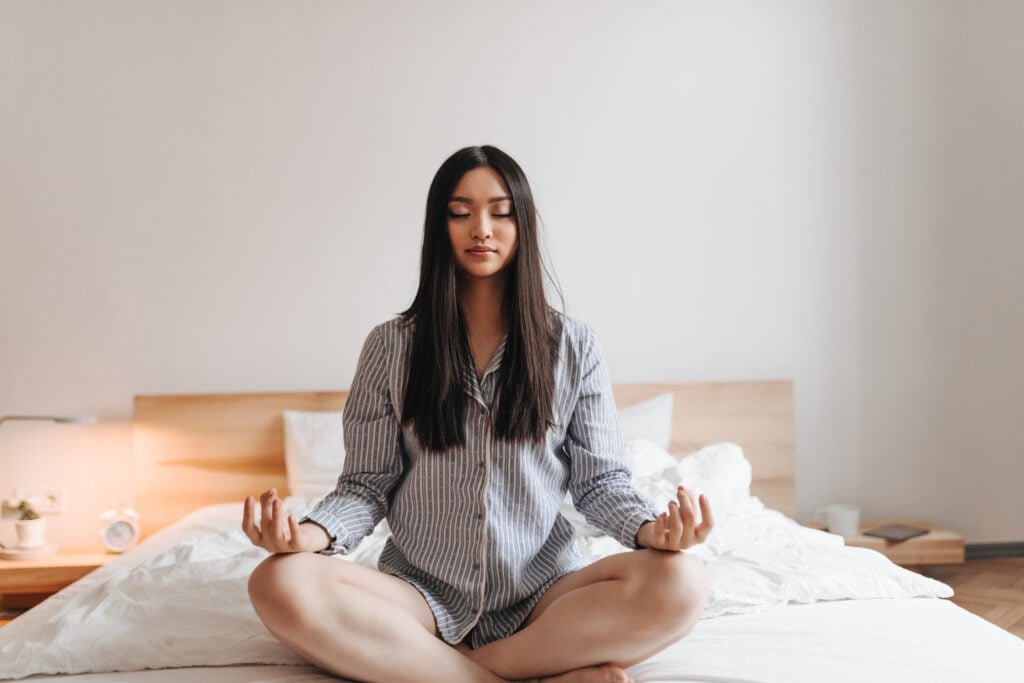In our fast-paced, often chaotic and demanding world, cultivating self-love and a strong inner connection has become more important than ever. Many of us find ourselves caught in the chaos of external demands, societal expectations, and self-criticism, leaving little room for genuine self-care and inner growth. This post explores how meditation can be a powerful tool for developing self-love and deepening your relationship with yourself. We’ll discuss practical techniques, share expert insights, and offer guidance on overcoming common challenges. By the end, you’ll have a comprehensive understanding of how to integrate self-love and meditation into your daily life, paving the way for greater peace, fulfillment, and overall well-being.
The Connection Between Self-Love and Meditation
Self-love and meditation are intrinsically linked, each supporting and enhancing the other. Both practices involve turning inward, cultivating awareness, and developing a compassionate relationship with oneself. Meditation provides a sacred space for self-reflection and acceptance, which are crucial components of self-love.
As renowned meditation teacher Sharon Salzberg notes,
“You can search throughout the entire universe for someone who is more deserving of your love and affection than you are yourself, and that person is not to be found anywhere. You, yourself, as much as anybody in the entire universe, deserve your love and affection.”
This powerful statement encapsulates the essence of combining self-love with meditation practice. Through meditation, we create a quiet, judgment-free zone to observe our thoughts, feelings, and bodily sensations without criticism or attachment.
The regular practice of meditation helps us develop mindfulness – the ability to be present in the moment without judgment. This mindfulness, in turn, allows us to observe our self-talk and internal narratives more objectively. We become aware of the often harsh or critical voice of our inner critic and can begin to cultivate a more compassionate, loving inner dialogue.

Benefits of Combining Self-Love and Meditation
The synergy between self-love and meditation yields numerous benefits that can positively impact various aspects of our lives:
- Increased self-awareness – Regular meditation practice improves our ability to observe our thoughts, emotions, and bodily sensations. This increased self-awareness is the foundation for developing self-love, as we learn to understand and accept ourselves more fully.
- Reduced stress and anxiety – Both meditation and self-love practices have been shown to lower cortisol levels (the stress hormone) in the body. By cultivating inner peace and self-acceptance, we become more resilient to external stressors.
- Improved emotional regulation – As we develop a more loving relationship with ourselves, we become better equipped to handle difficult emotions. Meditation teaches us to observe our feelings without being overwhelmed by them, while self-love practices help us respond to ourselves with kindness during challenging times.
- Enhanced self-compassion – The combination of meditation and self-love fosters a deep sense of self-compassion. We learn to treat ourselves with the same kindness and understanding that we would offer a dear friend.
- Greater overall well-being – Studies have shown that both meditation and self-love practices are associated with improved mental health, better physical health outcomes, and a greater sense of life satisfaction.
- Improved relationships – As we develop a more loving relationship with ourselves, we often find that our relationships with others improve as well. We become less dependent on external validation and more capable of genuine connection.
- Increased resilience – Self-love and meditation equip us with tools to bounce back from setbacks and challenges more effectively. We develop an inner strength that helps us navigate life’s ups and downs with greater ease.
Practical Meditation Techniques for Cultivating Self-Love
Now that we understand the importance and benefits of combining self-love and meditation, let’s explore some practical techniques you can incorporate into your daily routine:
Loving-Kindness Meditation
Also known as Metta meditation, this practice involves directing positive wishes toward yourself and others. It’s a powerful way to cultivate self-love and compassion.
How to practice:
- Find a comfortable seated position and take a few deep breaths to centre yourself.
- Begin by directing loving-kindness towards yourself. Repeat phrases such as:
- May I be happy
- May I be healthy
- May I be safe
- May I live with ease
Visualize yourself receiving these wishes, allowing feelings of warmth and love to arise. As you become comfortable, extend these wishes to others in your life – a loved one, a neutral person, a difficult person, and finally, all beings.
Practice this meditation for 10-15 minutes daily, gradually increasing the duration as you feel comfortable.
Self-Compassion Break
Developed by self-compassion researcher Dr. Kristin Neff, this technique is a quick and effective way to cultivate self-love, especially during challenging moments.
The practice involves three steps:
- Acknowledge your suffering – Recognize that you’re experiencing a difficult moment. Say to yourself, “This is a moment of suffering” or “This is hard.”
- Recognize that suffering is a shared human experience – Remind yourself that you’re not alone in your struggles. Say something like, “Suffering is a part of life” or “Many others have felt this way.”
- Offer yourself kindness and understanding – Place your hands over your heart, hug yourself or use another soothing touch. Say to yourself, “May I be kind to myself” or “May I give myself the compassion I need.”
This practice can be done in a minute or two, making it perfect for incorporating into daily life.
Body Scan Meditation
This practice involves systematically focusing on different parts of your body, promoting body awareness and acceptance. It can be particularly helpful for those struggling with body image issues or physical discomfort.
How to practice:
- Lie down or sit in a comfortable position.
- Close your eyes and take a few deep breaths to centre yourself.
- Begin at your toes, bringing your full attention to the sensations in this part of your body.
- Slowly move your attention upwards, scanning each part of your body – feet, ankles, calves, knees, and so on, all the way to the top of your head.
- As you focus on each area, notice any sensations without judgment. If you encounter areas of tension or discomfort, send breath and compassion to those areas.
- Once you’ve scanned your entire body, take a moment to feel your body as a whole.
Practice this meditation for 15-30 minutes daily, perhaps before bed or upon waking.

Mindful Self-Compassion Meditation
This practice combines mindfulness with self-compassion, helping you cultivate a kind and loving attitude towards yourself.
How to practice:
- Sit comfortably and take a few deep breaths.
- Bring to mind a situation in your life that’s causing you stress or pain.
- Notice where you feel this stress in your body. Place your hand on this area.
- Acknowledge your pain by saying something like, “This is difficult” or “I’m struggling right now.”
- Remind yourself of your common humanity: “Everyone experiences challenges like this. I’m not alone.”
- Offer yourself words of kindness: “May I be gentle with myself. May I give myself the care I need.”
- Take a few more deep breaths, feeling the warmth and care you’re offering yourself.
Practice this meditation for 10-15 minutes when you’re facing challenges or as a regular part of your routine.
Overcoming the Inner Critic
As you embark on this journey of self-love and meditation, you may encounter resistance from your inner critic or ego. This inner voice, often shaped by past experiences and societal conditioning, can be a significant obstacle to developing self-love.
Common negative thoughts might include:
- “I don’t deserve love”
- “I’m not good enough”
- “This is selfish”
- “I should be doing something more productive”
- “I’ll never be able to quiet my mind”
Remember, these thoughts are not facts. They are conditioned responses that have been reinforced over time. Acknowledge them without judgment and gently return to your meditation practice. With time and patience, the voice of self-compassion will grow stronger.
Strategies for managing the inner critic:
- Name it to tame it – When you notice your inner critic speaking up, label it. Say to yourself, “Ah, there’s my inner critic again.” This simple act of recognition can help create some distance between you and the critical thoughts.
- Reframe negative self-talk – Challenge your inner critic by reframing negative statements. For example, if your inner critic says, “I’m so bad at meditation,” try reframing it to, “I’m learning and improving with each practice.”
- Use compassionate self-talk – Speak to yourself as you would to a dear friend. If you wouldn’t say it to someone you love, don’t say it to yourself.
- Practice self-forgiveness – When you slip into self-criticism, forgive yourself. Remember that being human means being imperfect, and that’s okay.
Integrating Self-Love into Daily Life
While meditation provides a foundation for self-love, it’s important to carry this practice into your daily life. Here are some ways to integrate self-love into your everyday routine:
- Setting healthy boundaries – Learn to say no to things that don’t serve your well-being. Remember, setting boundaries is an act of self-love.
- Practicing self-care regularly – Engage in activities that nourish your body, mind, and soul. This could be taking a relaxing bath, reading a book, or going for a nature walk.
- Celebrating your achievements – Acknowledge your accomplishments, no matter how small. Take time to appreciate your efforts and progress.
- Surrounding yourself with supportive people – Cultivate relationships that uplift and encourage you. Limit time with those who drain your energy or undermine your self-worth.
- Practising gratitude – Regularly acknowledge the things you’re grateful for, including aspects of yourself.
- Engaging in positive self-talk – Make a conscious effort to speak kindly to yourself throughout the day.
- Nourishing your body – Eat nutritious foods, stay hydrated, and engage in physical activities you enjoy.
- Pursuing personal growth – Invest in your personal development through learning new skills, reading, or attending workshops.
- Practising mindfulness in daily activities – Bring the awareness you cultivate in meditation to your everyday tasks, whether it’s eating, walking, or working.
- Letting go of comparison – Remember that your journey is unique. Avoid comparing yourself to others and focus on your own growth.
As author Brené Brown reminds us,
“Talk to yourself like you would to someone you love.”
This simple yet profound advice can transform how we relate to ourselves in our daily lives.

Challenges and Solutions
While the benefits of combining self-love and meditation are numerous, it’s natural to encounter challenges along the way. Here are some common obstacles and strategies to overcome them:
- Difficulty finding time
Challenge: In our busy lives, it can be hard to carve out time for meditation and self-love practices.
Solution: Start with just 5 minutes a day and gradually increase. Remember, consistency is more important than duration. You can also try integrating mini-meditations into your daily routine, such as taking three mindful breaths before meals. - Mind wandering
Challenge: During meditation, you may find your mind constantly drifting to other thoughts.
Solution: This is entirely normal and part of the process. When you notice your mind wandering, gently redirect your attention to your chosen focus (like your breath) without judgment. Each time you do this, you’re strengthening your mindfulness muscle. - Feeling uncomfortable with self-focus
Challenge: For some, directing love and attention towards oneself can feel uncomfortable or even selfish.
Solution: Start slowly and be patient with yourself. Remember that self-love is not selfish – it’s necessary for your well-being and enables you to show up more fully for others. As you practice, this discomfort will likely diminish. - Dealing with difficult emotions
Challenge: Meditation and self-reflection can sometimes bring up challenging emotions.
Solution: Approach these emotions with curiosity and compassion. If emotions become overwhelming, it’s okay to take a break or seek support from a mental health professional. - Inconsistent practice
Challenge: It can be hard to maintain a regular practice, especially when life gets busy.
Solution: Set realistic goals and be kind to yourself if you miss a day. Consider finding an accountability partner or joining a meditation group for added motivation and support. - Expecting immediate results
Challenge: In our instant-gratification culture, it’s easy to become discouraged if we don’t see immediate changes.
Solution: Remember that meditation and self-love are lifelong practices. Celebrate small victories and trust in the process. Keep a journal to track your progress over time. - Comparing your practice to others
Challenge: You might feel that you’re not doing it “right” or that others are more advanced in their practice.
Solution: Remember that every person’s journey is unique. Focus on your own experience and growth rather than comparing yourself to others.
Expert Insights
To provide additional perspective, let’s consider insights from experts in the fields of meditation and self-compassion:
Dr. Kristin Neff, a pioneer in self-compassion research, emphasizes the importance of treating ourselves with the same kindness we would offer a good friend. She states,
“With self-compassion, we give ourselves the same kindness and care we’d give to a good friend.”
Meditation teacher Tara Brach introduces the concept of Radical Acceptance, encouraging us to embrace all aspects of our experience with compassion.
Mindfulness expert Jon Kabat-Zinn reminds us of the transformative power of present-moment awareness:
“The best way to capture moments is to pay attention. This is how we cultivate mindfulness. Mindfulness means being awake. It means knowing what you are doing.”
These expert perspectives underscore the profound impact that combining self-love and meditation can have on our lives.

Conclusion
Combining self-love and meditation can profoundly impact your well-being and inner connection. By consistently practising these techniques and integrating self-love into your daily life, you’ll develop a stronger, more compassionate relationship with yourself. Remember, this is a journey – be patient and kind to yourself along the way.
As you continue on this path of self-discovery and inner growth, keep in mind that everyone’s journey is unique. What works best for you may evolve over time, so stay open to exploring different practices and adjusting your approach as needed.
The practices and insights shared in this post are just the beginning. As you deepen your practice, you may find yourself wanting to explore further or seeking personalized guidance.
Are you ready to take your self-love and meditation practice to the next level? I offer individual coaching sessions designed to help you deepen your inner connection and cultivate lasting self-love. In these personalized sessions, we’ll work together to:
- Tailor meditation techniques to your specific needs and goals
- Address any challenges you’re facing in your practice
- Develop strategies for integrating self-love into your daily life
- Explore advanced meditation techniques for deepening your practice
Don’t wait to start your journey towards greater self-love and inner peace. Book your individual session today and experience the transformative power of personalized guidance.
To schedule your session or learn more, please click on this button:
Remember, investing in yourself is the most important investment you can make. You deserve love, compassion, and inner peace. Let’s work together to unlock your full potential and create a life filled with self-love and deep inner connection.




